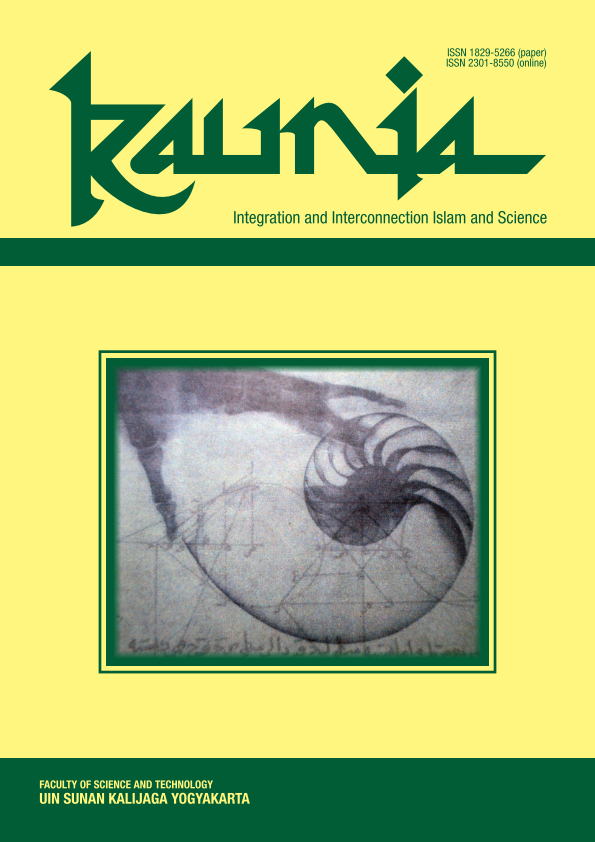The Glycemic Index Value of Hipa 7 and the Determination Method
DOI:
https://doi.org/10.14421/kaunia.2148Keywords:
glycemic index, Hipa 7, determination, methodAbstract
Carbohydrate content information of food does not enough to describe its physiological effect. Different carbohydrate sources give diverse blood glucose response. The concept of glycemic index (GI) was introduced to fill that gap. It divides food into several classifications according to their postprandial glycemic response. The original method was conducted by observing blood glucose after consuming sample then comparing the result with standard food. Later, miscellaneous in vitro digestion models were developed to mimic the in vivo condition. Rice is one of food types that have various GI which are related to the rice variety and postharvest processing method. There are some varieties that have low or medium GI, the others have higher. Parboiled and brown rice tend to have lower GI compared to their un-parboilled milled rice form. Hipa 7 is hybrid new superior variety that that had been launched by ICRR in 2009 and its milled rice has low glycemic index 49.2. Low glycemic index rice potentially reduced the occurrence of obesity and diabetic mellitus disease.
References
Astawan M dan Wresdiyati T 2004 Healthy Diet with Fiber Dietary Food Solo: Tiga Serangkai Pustaka Mandiri
BeMiller JN and Whistler RL.1996 Carbohydrates pp. 157 224. In O.R. Fennema (Ed.) Food Chemistry 3rd Ed Marcel Dekker Inc., New York
Brouns FI et al 2005 Glycaemic index methodology Nutrition Research Review, 18,145–171
Cruz NMD 2002 Rice grain quality evaluation procedures In Graham R (Ed) A Proposal for IRRI to Establish a Grain Quality and Nutrition Research Center Discussion Paper No. 44 International Rice Research Institute 2002 15 p
Eckel RH 2003 A new look at dietary protein in diabetes Am J Clin Nutr 76:5–56
FAO/WHO 1998 Carbohydrate in Human Nutrition: Report of a joint FAO/WHO Expert Consultation, April 14-18, 1997 Food and Nutrition Paper Rome FAO. 140 pp. http://www.fao.org/docrep/w8079e [11 Maret 2005]
Foster-Powell KF et al 2002 International table of glycemic index and glycemic load values:2002 Am. J. Clin. Nutr. 76:5–56
Gibson GR and Williams CM 2000 Functional Foods Concept to Product Woodhead Publishing Limited Boca Raton 374p
Ha MA et al 2000 A Definition for Dietary Fiber Eur J Clin Nutr., Vol 54:861-864
Hansen THE et al 2012 Losses of essential mineral nutrients by polishing of rice differ among genotypes due to contrasting grain hardness and mineral distribution Cereal Chemistry Volume 56, Issue 2, September 2012, Pages 307-315
Hu P et al 2004 Starch digestibility and estimated glycemic score of different types of rice differing of amylase content J. Cereal Sci. 40:231-237
IDF (International Diabetes Federation) 2013 Diabetes Atlas. Sixth Ed www.idf.org
Indrasari SD et al 2008 Nilai Indeks Glikemik Beras Beberapa Varietas Padi. Jurnal Penelitian Pertanian Tanaman Pangan 27(3):127-134
Indrasari SD et al 2017 The functional properties of popular rice varieties in Indonesia Presented on International Conference on Organic Agriculture in the Tropics: State-of-the-Art, Challenge and Opportunities Yogyakarta, August 20-24, 2017 Faculty of Agriculture Universitas Gadjah Mada
Jenkins DJA 2002 Glycemic index: overview of implications in health and disease. The American Journal of Clinical Nutrition, Volume 76, Issue 1, 1 July 2002, Pages 266S–273S, https://doi.org/10.1093/ajcn/76.1.266S
Kale SJ et al 2015 Soaking Induced Changes in Chemical Composition, Glycemic Index and Starch Characteristics of Basmati Rice Rice Science 22(5): 227−236
Lalegani S et al 2018 Inhibitory activity of phenolic-rich pistachio green hull extract-enriched pasta on key type 2 diabetes relevant enzymes and glycemic index Food Research International 105: 94–101
Mercier C and Colonna P 1988 Starch and enzymes: Innovations in the products, process and uses Biofuture Chimic. P. 55-60
Nanri A et al 2010 Rice intake and type 2 diabetes in Japanes men and women: the Japan Public Heath Center-based Prospective Study American Journal of Clinical Nutrition 92:1468-1477
Purwani EY et al 2007 Rice physic-chemical trait and glycemic index Journal of Technology and Food Industry Vol XVIII (1):59–66
Rimbawan dan Siagian A 2004 Indeks Glikemik pangan. Penebar Swadaya Jakarta 124 hal
Sun QD et al 2010 White rice, brown rice, and risk of type 2 diabetes in US men and women Arch Intern Med 170:961–969
Tharanthan RN and Mahadevamma S 2003 Grain legumes, a boon to human nutrition Trends Food Sci. Technol. 14(12): 507-518
Tjokroadikoesoemo PS 1986 HFS dan Industri Ubi Kayu Lainnya PT Gramedia Jakarta
Villegas RS et al 2007 Prospective study of dietary carbohydrates, glycemic index, glicemic load, and incidence of type 2 diabetes mellitus in middle-aged Chinese women Archives of Internal Medicine. 26: 2310-2316
Waspadji S 2007 Diabetes Mellitus Dalam Penatalaksanaan Diabetes Mellitus Terpadu Fakultas Kedokteran Universitas Indonesia Jakarta
Wibowo P et al 2010 Karakterisasi Sifat Fisik, Fisikokimia, Gizi dan Indeks Glikemik Beras dari Beberapa Varietas/Galur Harapan Padi Laporan Akhir Tahun. Balai Besar Penelitian Tanaman Padi Subang
Widowati S 2007 The Use of Green Tea Extract Hijau (Camellia sinensis) in Developing Functional Rice for People Suffering Diabetes Mellitus Dissertation: Post-Graduate School Institut Pertanian Bogor
Widowati S et al 2009 Penurunan Indeks Glikemik berbagai varietas beras melalui proses pratanak J. Pascapanen 6 (1) 2009:1-9
Wolever TMS 2006 The Glycemic Index A Physiological Classification of Dietary Carbohydrate CABI 227p
Downloads
Published
Issue
Section
License
All articles published in Kaunia are licensed under a Creative Commons Attribution-NonCommercial-ShareAlike 4.0 International license, with the copyright to these articles held by the journal. Anyone is free to read, download, copy, distribute, print, search, link to full text articles, or transform an article, in any medium or format, provided they do so non-commercially, give appropriate credit to Kaunia, and distribute any derivative work under the same (or equivalent) terms.
By submitting to Kaunia, authors agree to both the terms of the CC BY-NC-SA license and the automatic transfer of the copyright to their article if it is accepted.









